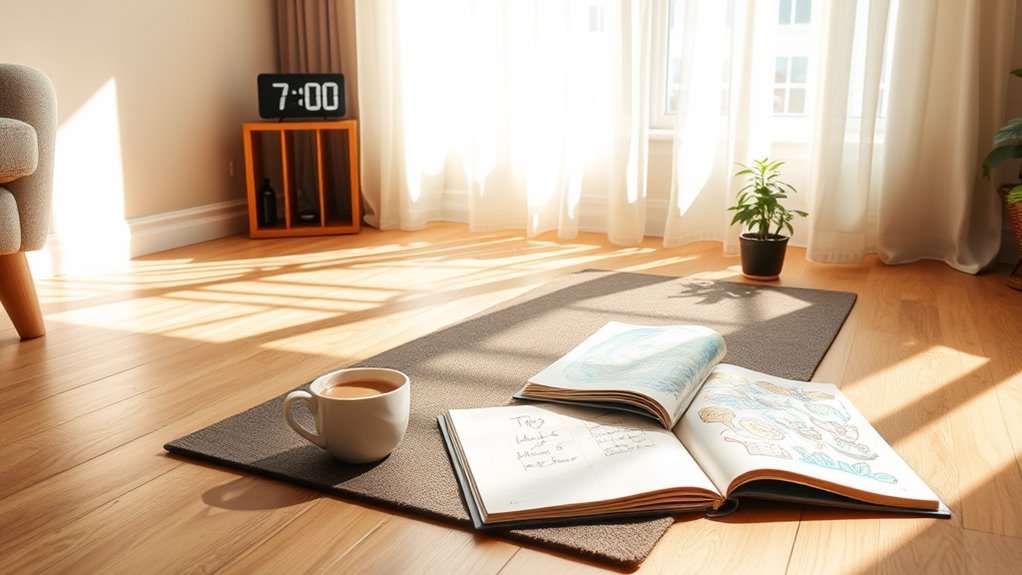Mind Detox- Simple Strategies to Clear Mental Clutter
To clear mental clutter, start by practicing mindfulness meditation and engaging in deep breathing to anchor yourself in the present. Organize your physical space and establish healthy boundaries to protect your mental environment. A digital detox helps too—limit your screen time and unfollow toxic accounts. Journaling can release lingering thoughts, while regular reflection boosts self-awareness. By incorporating these simple strategies, you’ll find mental clarity and peace, and there’s more to explore on your journey to mental wellness.
Key Takeaways
- Practice mindfulness through deep breathing exercises to anchor yourself in the present and reduce racing thoughts.
- Establish daily limits for screen time and social media usage to minimize distractions and promote mental clarity.
- Declutter your physical environment to create a calming space that enhances focus and encourages mental detox.
- Set clear boundaries to protect your mental space, allowing time for self-care and prioritizing personal growth.
- Engage in regular reflection through journaling to track insights, enhance self-awareness, and promote emotional stability.
Understanding Mental Clutter
Understanding this mental clutter is essential for your mental detox journey. It’s not just about eliminating distractions; it’s about recognizing the sources of your mental chaos. Identify the negative thought patterns, unproductive habits, and emotional baggage that contribute to your clutter. By confronting these elements, you empower yourself to take control. You’ll discover that clarity and focus emerge when you actively declutter your mind. Additionally, practicing mental detox strategies can significantly enhance your ability to clear away this clutter.
The Importance of a Mind Detox
A mind detox is essential for achieving mental clarity and reducing stress and anxiety in your life.
When you clear away the clutter, you create space for fresh ideas and a calmer mindset.
Embracing this practice can transform how you think and feel daily. Additionally, incorporating techniques for a mental detox can significantly enhance your overall well-being.
Benefits of Mental Clarity
When you clear your mind through detox strategies, you reveal a range of benefits that enhance your overall well-being.
Embracing mental clarity empowers you to:
-
Boost Focus: Sharpen your concentration, allowing you to tackle tasks with precision and efficiency.
-
Enhance Creativity: Open the floodgates of your imagination, generating innovative ideas and solutions.
-
Improve Decision-Making: Analyze situations more effectively, leading to informed choices that align with your goals.
-
Elevate Emotional Resilience: Strengthen your ability to navigate challenges, fostering a positive mindset and reducing mental fatigue.
Additionally, implementing these strategies can lead to enhanced peace and clarity, significantly improving your overall mental health.
Reducing Stress and Anxiety
Mental clarity not only sharpens your focus but also plays a significant role in reducing stress and anxiety. When your mind is free from clutter, you can tackle challenges with confidence and resilience.
Start by identifying your stressors and prioritizing your tasks. Use techniques like mindfulness and deep breathing to anchor yourself in the present moment. Setting clear boundaries in your life helps protect your mental space, allowing you to recharge effectively.
Embrace simplicity by decluttering your environment, both physically and mentally. By actively engaging in a mind detox, you’ll cultivate a sense of control and calm, empowering you to face life’s demands with poise. Incorporating mindfulness practices into your routine can further enhance your mental clarity and emotional resilience.
Ultimately, a clearer mind fosters emotional stability and enhances your overall well-being.
Practicing Mindfulness Meditation
How can you cultivate a deeper sense of calm and awareness in your daily life? Practicing mindfulness meditation is a powerful tool to help you achieve that.
Start by incorporating these simple techniques into your routine:
-
Find a quiet space****: Choose a serene environment free from distractions, allowing your mind to settle.
-
Focus on your breath: Pay attention to each inhale and exhale, letting go of racing thoughts.
-
Observe your thoughts: Acknowledge any distractions without judgment; just let them drift away.
-
Set a timer: Begin with just five minutes, gradually increasing the duration as you become more comfortable.
Additionally, incorporating deep breathing techniques can enhance your mindfulness practice by further promoting relaxation and reducing stress.
Organizing Your Physical Space
While you may not realize it, the state of your physical space can greatly impact your mental well-being. A cluttered environment often leads to a cluttered mind, making it harder to focus and think clearly.
Start by evaluating your surroundings; identify items that no longer serve a purpose. Create designated zones for different activities—work, relaxation, and creativity. This organization fosters a sense of control and clarity.
Regularly declutter and maintain these spaces to prevent accumulation. Invest in storage solutions that align with your aesthetics and functionality.
Journaling to Release Thoughts
Journaling can be a powerful tool for releasing thoughts and emotions, especially when life feels overwhelming. By putting pen to paper, you create a safe space to explore your feelings and clarify your mind.
Here are four effective journaling strategies:
-
Stream of Consciousness: Write without stopping for a set time. Let your thoughts flow freely onto the page.
-
Gratitude Lists: List three things you’re grateful for each day to shift your focus and uplift your spirit.
-
Prompted Reflections: Use specific prompts to dive deeper into your feelings, such as “What challenges am I facing?”
-
Future Visualization: Describe your ideal life in detail to inspire motivation and clarity.
This practice can help you regain control over your mental landscape.
Digital Detox: Reducing Screen Time
You mightn’t realize how much time you spend on social media until you actually track it.
By limiting your usage and scheduling specific device-free times, you can reclaim precious moments for yourself.
A digital detox can help you feel more present and connected to the world around you.
Limit Social Media Usage
Social media can feel like a double-edged sword—connecting us to others while often draining our mental energy.
To regain control, limit your usage with these strategies:
-
Set Daily Time Limits: Allocate specific hours for social media, using a timer to enforce it.
-
Unfollow Toxic Accounts: Curate your feed by unfollowing profiles that trigger negativity or stress.
-
Turn Off Notifications: Silence distractions by disabling alerts, allowing you to engage on your terms.
-
Engage Mindfully: Instead of mindlessly scrolling, interact with content that enriches your knowledge or inspires you.
Schedule Device-Free Times
How often do you find yourself glued to your screen, even when you intended to take a break? Scheduling device-free times can greatly enhance your mental clarity and productivity. By carving out specific periods in your day to unplug, you allow your mind to recharge and refocus.
| Time Block | Activity | Benefit |
|---|---|---|
| 8 AM – 9 AM | Morning Routine | Set a positive tone |
| 12 PM – 1 PM | Lunch Break | Boost energy levels |
| 6 PM – 8 PM | Family/Personal Time | Strengthen relationships |
Implementing these blocks not only reduces screen fatigue but also enriches your life in tangible ways. Embrace this simple yet powerful strategy to reclaim your time!
Engaging in Physical Activity
While engaging in physical activity might seem intimidating at first, it can be a powerful strategy for detoxing your mind.
When you move your body, you not only improve your physical health but also clear mental clutter.
Here are some effective ways to incorporate physical activity into your routine:
-
Go for a brisk walk in nature****, letting the fresh air rejuvenate your thoughts.
-
Join a local fitness class, where you can learn new skills while connecting with others.
-
Try yoga or meditation, focusing on your breath to enhance mindfulness.
-
Engage in sports, allowing the thrill of competition to energize your spirit.
Establishing Healthy Boundaries
Establishing healthy boundaries is essential for maintaining mental clarity and emotional well-being, especially when you feel overwhelmed by external demands.
Start by identifying your limits—what you can tolerate and what drains your energy. Communicate these boundaries clearly and assertively to others; this isn’t selfish but necessary for your mental health.
Practice saying “no” when commitments threaten to overextend you, allowing space for what truly matters. Allocate time for yourself without feeling guilty; self-care enhances your capacity to engage with others positively.
Regularly assess your boundaries as circumstances change. Remember, healthy boundaries empower you to protect your mental space, enabling you to flourish in both personal and professional spheres.
Prioritizing these limits fosters resilience and clarity in your life.
Creating a Daily Reflection Routine
Once you’ve set healthy boundaries, the next step is to create a daily reflection routine that enhances your self-awareness and emotional well-being.
This practice helps you gain clarity on your thoughts and feelings, leading to mastery over your mental landscape.
Here are four key components to contemplate:
-
Set a Specific Time: Choose a time each day that’s solely dedicated to reflection.
-
Create a Comfortable Space: Find a quiet, inviting spot where you can focus without distractions.
-
Use Prompts: Employ thought-provoking questions to guide your reflection, such as “What did I learn today?”
-
Journal Your Insights: Write down your thoughts and feelings to solidify your understanding and track your growth.
Frequently Asked Questions
How Long Does a Mind Detox Typically Take to Show Results?
Typically, you might start noticing results from a mind detox within a few days to a couple of weeks. The key’s consistency; the more you commit, the more profound your experience and clarity will be.
Can Children Benefit From Mind Detox Strategies?
Absolutely, kids can thrive from these rejuvenating techniques! By embracing calming practices, you’ll help them cultivate focus and emotional balance. It’s a wonderful way to nurture their minds and enhance their overall well-being.
What Are Common Signs of Mental Clutter?
You’ll notice common signs of mental clutter like constant distractions, difficulty focusing, overwhelming stress, and fatigue. These symptoms hinder your productivity and clarity, making it essential to address them for better mental performance and well-being.
Are There Specific Diets That Support Mental Clarity?
When it comes to mental clarity, you can’t judge a book by its cover. Embrace a diet rich in omega-3 fatty acids, antioxidants, and whole foods. They’ll sharpen your focus and elevate your cognitive function.
How Can I Maintain Mental Clarity After Detoxing?
To maintain mental clarity after detoxing, prioritize consistent sleep, balanced nutrition, and regular exercise. Incorporate mindfulness practices daily, stay organized, and limit distractions. These strategies will help you sustain sharp focus and mental resilience.





